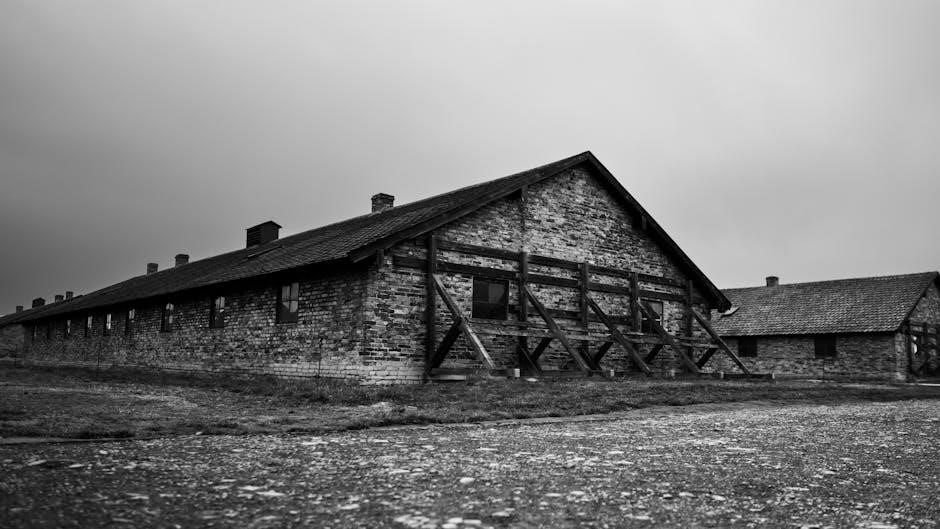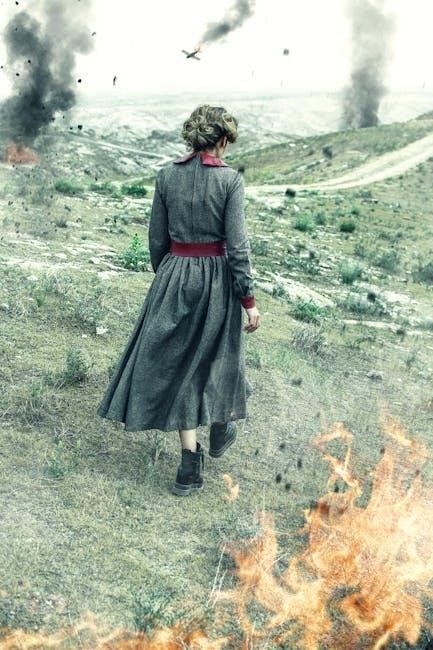The War of the Worlds PDF: An Overview
H.G. Wells’ “The War of the Worlds” remains a cornerstone of science fiction. Its exploration of Martian invasion has captivated readers for generations. The PDF version offers accessible ways to experience this influential novel, including the themes of colonial imperialism.
H.G. Wells and The War of the Worlds
H.G. Wells, a prolific English writer, penned “The War of the Worlds” between 1895 and 1897. It was published in 1898 and serialized in Pearsons Magazine. It explores themes of social Darwinism and fear of the unknown.
Author Background
Herbert George Wells, most famously known as H. G. Wells, was a visionary English author. He is celebrated for his groundbreaking contributions to the science fiction genre. Born on September 21, 1866, Wells’s literary works often delved into social commentary and speculative themes. This made him a prominent voice of his time.
Wells is best known for iconic novels like “The Time Machine,” “The Invisible Man,” and, of course, “The War of the Worlds.” His writing frequently explored the potential implications of scientific advancements and societal structures. His works continue to resonate with readers today. He died August 13, 1946.
Wells’ insightful narratives not only entertained but also encouraged critical reflection on humanity’s place in the world and its future.
Publication History
“The War of the Worlds” initially appeared as a serial publication. It was featured in Pearson’s Magazine in the United Kingdom and Cosmopolitan magazine in the United States during 1897. This episodic release built anticipation for Wells’s thrilling tale of Martian invasion. The full novel was subsequently published in hardcover in 1898 by William Heinemann.
The book’s immediate success solidified its place in literary history. It also ensured its enduring availability to readers. Its release coincided with a period of burgeoning interest in science fiction. This further cemented its popularity. Since its original publication, “The War of the Worlds” has remained consistently in print. It has been adapted across various media, demonstrating its timeless appeal and cultural significance. The novel continues to be widely read and studied today.

Synopsis of The War of the Worlds
The novel tells of a Martian invasion of Earth. It follows an unnamed protagonist’s experiences as humanity faces technologically superior aliens. The story explores themes of survival, colonialism, and the fear of the unknown.
The Martian Invasion
The narrative begins with observations of Mars, hinting at impending doom. Cylinders crash on Earth, unleashing Martians. The aliens possess advanced technology, including heat-rays and fighting machines. Initial encounters lead to widespread panic and destruction as the Martians demonstrate their brutal efficiency. The invasion throws society into chaos, forcing people to confront their mortality.
Military forces prove ineffective against Martian technology. The Martians’ superior weaponry quickly overwhelms human defenses. The text details the shocking collapse of societal structures. Survivors flee, desperately seeking safety from the relentless invaders. The narrative captures the terror and helplessness experienced by those witnessing the Martian onslaught. The invasion marks a turning point in human history.
Humanity’s Struggle for Survival
Faced with annihilation, humanity’s fight manifests in diverse ways. Some seek refuge in the countryside, hoping to evade the Martian advance. Others attempt to understand the enemy, searching for vulnerabilities. The narrative follows individuals confronting their fear and desperation. The struggle highlights both the best and worst aspects of human nature. Acts of selflessness and sacrifice contrast with instances of greed and panic.
The protagonist’s journey reflects the broader societal struggle. He witnesses the breakdown of order and the resilience of the human spirit. The story underscores the adaptability and determination necessary for survival. Ultimately, humanity’s salvation comes from an unexpected source. The Martians fall victim to Earth’s microbes.

Themes in The War of the Worlds
Wells’ “The War of the Worlds” explores many themes. It provides social commentary on colonialism, social Darwinism, and the fear of the unknown. These elements contribute to the novel’s lasting impact and relevance today.
Colonialism and Imperialism
“The War of the Worlds” intricately examines colonialism and imperialism. The Martian invasion mirrors the European colonial expansion of the 19th century, reflecting anxieties about the consequences of unchecked power. Wells uses the Martians’ ruthless exploitation of Earth to critique the imperialistic practices of his time.
The novel prompts readers to consider the ethical implications of domination and resource extraction. By portraying humans as victims of a superior invading force, Wells reverses the roles. This challenges the prevailing attitudes toward colonized populations. “The War of the Worlds” serves as a cautionary tale about the dangers of unchecked ambition and disregard for other beings.
Social Darwinism
“The War of the Worlds” reflects the prevalent social Darwinist thought of the late 19th century. The Martian invasion challenges humanity’s perceived dominance, exposing the fragility of civilization. The novel questions whether humans are truly the “fittest” species when faced with a superior force.
Wells uses the Martian’s advanced technology and ruthless efficiency to critique the notion of inherent human superiority. The initial human response of panic and disarray highlights the limitations of social structures in the face of existential threat. The story suggests that survival depends not only on strength, but also on adaptability and cooperation, challenging core tenets of Social Darwinism.
Fear of the Unknown
A central theme in “The War of the Worlds” is the profound fear of the unknown, embodied by the Martian invaders. The unfamiliar nature of the Martians, their motives, and their technology creates widespread panic and societal breakdown. This fear stems from humanity’s inability to comprehend or control the alien threat. The unknown becomes a catalyst for primal anxieties, revealing the vulnerability of human existence.
Wells masterfully portrays how the inexplicable provokes terror. The grotesque appearance and incomprehensible actions of the Martians amplify the sense of dread. This fear extends beyond the immediate danger, reflecting a deeper unease about the vastness of the universe and the potential for unimaginable threats lurking beyond human understanding.

Availability of The War of the Worlds in PDF Format
The “War of the Worlds” in PDF format is widely accessible. Project Gutenberg and various online sources offer free downloads. This allows readers easy access to Wells’ classic science fiction novel.
Project Gutenberg
Project Gutenberg offers a free digital edition of “The War of the Worlds.” This version is readily available for download in various formats, including PDF. It’s a volunteer effort that digitizes and proofreads books, ensuring accessibility for all. This makes it an invaluable resource for those seeking to read H.G. Wells’ seminal work without cost.
The Gutenberg edition is based on public domain texts, so it is free of copyright restrictions. Users can freely copy, distribute, and reuse the book. This availability aligns with Project Gutenberg’s mission to provide free access to electronic books. The War of the Worlds on Project Gutenberg ensures the classic novel remains available.
Other Online Sources
Beyond Project Gutenberg, “The War of the Worlds” PDF can be found across various online platforms. Many websites offer free ebook downloads, but caution is advised. Ensure the source is reputable to avoid malware or copyright infringement. Sites like Standard Ebooks provide well-formatted, free editions.
Amazon also offers a Kindle edition, often at a low price or free for Prime members. Always verify the edition and publisher. Some sites may offer scanned PDFs, which can vary in quality. Explore options like Planet PDF for designed versions. Comparing sources ensures the best reading experience.

The War of the Worlds: Adaptations and Influence
“The War of the Worlds” has profoundly impacted popular culture. From Orson Welles’ infamous radio broadcast to numerous film adaptations, the Martian invasion narrative continues to be reimagined and inspire new generations of science fiction enthusiasts.
Radio Broadcast
The most famous adaptation of “The War of the Worlds” is undoubtedly Orson Welles’ 1938 radio broadcast. Presented as a series of news bulletins, the broadcast simulated a real-time Martian invasion of Earth. The realism of the production, combined with the anxieties of the pre-World War II era, led to widespread panic among listeners who believed the events were actually unfolding.
Despite disclaimers, the broadcast sparked a national sensation, highlighting the power of radio as a medium and the potential for mass hysteria. The event solidified “The War of the Worlds” as a cultural touchstone, demonstrating its enduring relevance and ability to tap into collective fears. It remains a landmark example of media’s impact.
Film Adaptations
“The War of the Worlds” has seen numerous film adaptations, each reflecting the anxieties and technological capabilities of its time. The 1953 film, a Cold War allegory, transposed the setting to America and emphasized the threat of an unseen enemy. Its iconic Martian war machines and vibrant visuals remain influential.
Later adaptations, such as the 2005 Steven Spielberg film, utilized modern special effects to create a more visceral and terrifying depiction of the Martian invasion. These adaptations explore themes of societal collapse, human resilience, and the struggle for survival. Each film offers a unique interpretation, ensuring the story’s continued relevance across generations. The story is relatively straightforward and scary.
The War of the Worlds: Critical Reception
H.G. Wells’ “The War of the Worlds” garnered immediate attention and has sustained critical interest. Its initial publication was praised for its realism, suspense, and social commentary, establishing Wells as a prominent voice in science fiction. Critics have lauded its exploration of colonialism, fear of the unknown, and human nature under extreme duress.
Some criticisms have focused on the novel’s pacing or perceived scientific inaccuracies, yet its lasting impact on literature, film, and popular culture is undeniable. “The War of the Worlds” continues to be analyzed for its themes, narrative techniques, and enduring resonance, solidifying its place as a literary classic. It is fairly easy to read, with a reading ease of 69.11.
